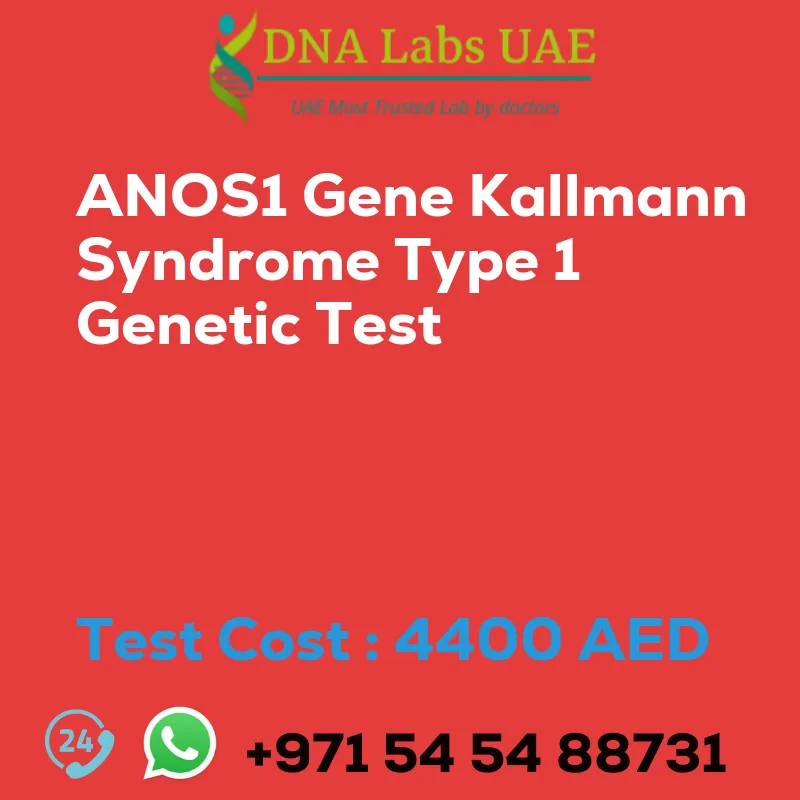ANOS1 Gene Kallmann Syndrome Type 1 Genetic Test
Test Name: ANOS1 Gene Kallmann Syndrome Type 1 Genetic Test
Components: ANOS1 Gene Kallmann Syndrome Type 1 Genetic Test
Price: 4400.0 AED
Sample Condition: Blood or Extracted DNA or One drop Blood on FTA Card
Report Delivery: 3 to 4 Weeks
Method: NGS Technology
Test Type: Hepatology, Nephrology, Endocrinology Disorders
Doctor: General Physician
Test Department: Genetics
Pre Test Information: Clinical History of Patient who is going for ANOS1 Gene Kallmann Syndrome Type 1 NGS Genetic DNA Test. A Genetic Counselling session to draw a pedigree chart of family members affected with ANOS1 Gene Kallmann Syndrome Type 1 NGS Genetic DNA Test gene ANOS1
Test Details: The ANOS1 gene, also known as the KAL1 gene, is associated with Kallmann syndrome type 1. Kallmann syndrome is a rare genetic disorder characterized by the combination of delayed or absent puberty and an impaired sense of smell (anosmia or hyposmia). NGS (Next-Generation Sequencing) genetic testing is a technique used to analyze multiple genes simultaneously. In the context of Kallmann syndrome type 1, NGS genetic testing involves sequencing the ANOS1 gene to identify any mutations or variations that may be causing the disorder.
The NGS test for ANOS1 gene mutations can be helpful in diagnosing Kallmann syndrome type 1 and determining the underlying genetic cause. It can also be used for carrier testing and genetic counseling for individuals with a family history of the disorder. The test involves obtaining a DNA sample, typically through a blood or saliva sample, and analyzing the sequence of the ANOS1 gene using advanced sequencing technologies. The results are then interpreted by genetic specialists to identify any mutations or variations that may be contributing to the development of Kallmann syndrome type 1.
NGS genetic testing for ANOS1 gene mutations can provide important information for diagnosis, treatment, and genetic counseling for individuals with Kallmann syndrome type 1. It can help guide personalized treatment plans and provide information about the risk of passing the condition on to future generations.
| Test Name | ANOS1 Gene Kallmann syndrome type 1 Genetic Test |
|---|---|
| Components | |
| Price | 4400.0 AED |
| Sample Condition | Blood or Extracted DNA or One drop Blood on FTA Card |
| Report Delivery | 3 to 4 Weeks |
| Method | NGS Technology |
| Test type | Hepatology Nephrology Endocrinology Disorders |
| Doctor | General Physician |
| Test Department: | Genetics |
| Pre Test Information | Clinical History of Patient who is going for ANOS1 Gene Kallmann syndrome type 1 NGS Genetic DNA Test. A Genetic Counselling session to draw a pedigree chart of family members affected with ANOS1 Gene Kallmann syndrome type 1 NGS Genetic DNA Test gene ANOS1 |
| Test Details |
ANOS1 gene, also known as KAL1 gene, is associated with Kallmann syndrome type 1. Kallmann syndrome is a rare genetic disorder characterized by the combination of delayed or absent puberty and an impaired sense of smell (anosmia or hyposmia). NGS (Next-Generation Sequencing) genetic testing is a technique used to analyze multiple genes simultaneously. In the context of Kallmann syndrome type 1, NGS genetic testing involves sequencing the ANOS1 gene to identify any mutations or variations that may be causing the disorder. The NGS test for ANOS1 gene mutations can be helpful in diagnosing Kallmann syndrome type 1 and determining the underlying genetic cause. It can also be used for carrier testing and genetic counseling for individuals with a family history of the disorder. The test involves obtaining a DNA sample, typically through a blood or saliva sample, and analyzing the sequence of the ANOS1 gene using advanced sequencing technologies. The results are then interpreted by genetic specialists to identify any mutations or variations that may be contributing to the development of Kallmann syndrome type 1. NGS genetic testing for ANOS1 gene mutations can provide important information for diagnosis, treatment, and genetic counseling for individuals with Kallmann syndrome type 1. It can help guide personalized treatment plans and provide information about the risk of passing the condition on to future generations. |








